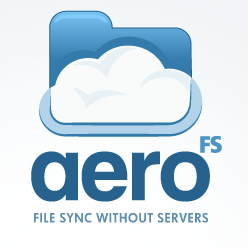I’ve been a fan of Dropbox for a long time. It’s convenient, it ‘just works’, and 2GB of free storage can go a long way. But it isn’t perfect — if you’re dealing with very large amounts of data, like movie footage, then you’ll quickly find yourself in the service’s most expensive tiers. And some businesses and professionals dealing with sensitive data simply aren’t permitted to store it on third-party servers for security reasons.
If any of these concerns sound familiar to you, you’ll likely be very interested in a Y Combinator-backed company called AeroFS. The pitch is straightforward: it’s basically Dropbox, but instead of using servers controlled by a third party to store and sync your data, you transfer the data directly between your own devices.
If you’ve used Dropbox, you’ll feel right at home with AeroFS. After installing small clients on your computer (the service supports Windows, Mac, and Linux), you drag and drop the files you’d like to sync between machines into a special folder, called a Library. Add a file to that folder, and it’ll automatically sync to your other devices, which send the data to each other through peer-to-peer connections rather than through a third-party server.
This setup a few benefits. For one, it means that your data is never stored on AeroFS’s servers, which makes it appealing for the aforementioned companies that can’t use cloud services like Dropbox. Second, it means you can sync as much data as you’d like without having to pay for additional server-side storage, making it appealing to people who deal with large amounts of data.
Of course, this peer-to-peer system has one downside. Unlike Dropbox, which lets you access and sync your data any time you have an Internet connection, with AeroFS there’s an additional requirement: you can only access a file that’s stored on a different machine if that machine is turned on. Say, for example, you edited an important document on your desktop machine at home, then jumped on a flight and attempted to access it a few hours later from your laptop. If you forgot to leave your desktop machine turned on, you’d probably be out of luck.
AeroFS founder Yuri Sagalov acknowledges this could potentially be an issue, but says that in many cases it isn’t really a big deal. One reason why, he explains, is that many offices already have servers and computers running all the time anyway; they can just install AeroFS on these machines and use them as their main datastores.
And AeroFS gives you another option for those mission-critical files: you can opt to selectively backup certain folders to AeroFS’s servers, which means you can access the files at any time. This feature is essentially a clone of Dropbox, and you lose the security benefits of a purely peer-to-peer sync. But it makes sense — you probably have some files that you’re fine storing in the cloud, and others that you’d rather keep inside your firewall. AeroFS gives you the flexibility to have it both ways.
The company says there’s a big market for this, particularly among healthcare providers, lawyers, finance firms, movie professionals (who can use it to securely share content between machines), and other companies who have data that can’t leave their internal firewall.
AeroFS also has an impressive list of backers. Y Combinator founder Paul Graham says that company is one of the most important from any of the firm’s batches. Other investors include Ron Conway, Ashton Kutcher, Andreessen-Horowitz, Ash Patel, Jerry Yang, Naval Ravikant, Chris Sacca, Ace & Company, Geoff Ralston, Paul Buchheit, and Maynard Webb.
